w+
#include <stdio.h>
int main()
{
FILE *fp;
fp = fopen("test.txt", "w+"); //write and read mode
fprintf(fp, "This is testing for fprintf...\n");
rewind(fp); //rewind () function moves file pointer position to the beginning of the file.
char ch;
while((ch=getc(fp))!=EOF)
putchar(ch);
fclose(fp);
}
output
This is testing for fprintf...
test.txt
This is testing for fprintf...
w and r to form w+
#include <stdio.h>
int main()
{
FILE *fp;
fp = fopen("test.txt", "w"); //only write mode
fprintf(fp, "This is testing for fprintf...\n");
fclose(fp);
fp = fopen("test.txt", "r");
char ch;
while((ch=getc(fp))!=EOF)
putchar(ch);
fclose(fp);
}
output
This is testing for fprintf...
test.txt
This is testing for fprintf...
r+
test.txt
This is testing for fprintf...
#include<stdio.h>
int main()
{
FILE *fp;
fp = fopen("test.txt", "r+"); //read and write mode
char ch;
while((ch=getc(fp))!=EOF)
putchar(ch);
rewind(fp); //rewind () function moves file pointer position to the beginning of the file.
fprintf(fp, "This is testing for fprintf again...\n");
fclose(fp);
return 0;
}
output
This is testing for fprintf...
test.txt
This is testing for fprintf again...
r and w to form r+
test.txt
This is testing for fprintf...
#include<stdio.h>
int main()
{
FILE *fp;
fp = fopen("test.txt", "r");
char ch;
while((ch=getc(fp))!=EOF)
putchar(ch);
fclose(fp);
fp=fopen("test.txt","w");
fprintf(fp, "This is testing for fprintf again...\n");
fclose(fp);
return 0;
}
output
This is testing for fprintf...
test.txt
This is testing for fprintf again...
a+
test.txt
This is testing for fprintf...
#include<stdio.h>
int main()
{
FILE *fp;
fp = fopen("test.txt", "a+"); //append and read mode
char ch;
while((ch=getc(fp))!=EOF)
putchar(ch);
rewind(fp); //rewind () function moves file pointer position to the beginning of the file.
fprintf(fp, "This is testing for fprintf again...\n");
fclose(fp);
return 0;
}
output
This is testing for fprintf...
test.txt
This is testing for fprintf...
This is testing for fprintf again...
a and r to form a+
test.txt
This is testing for fprintf...
#include<stdio.h>
int main()
{
FILE *fp;
fp = fopen("test.txt", "a"); //append and read mode
char ch;
while((ch=getc(fp))!=EOF)
putchar(ch);
fclose(fp);
fp=fopen("test.txt","r");
fprintf(fp, "This is testing for fprintf again...\n");
fclose(fp);
return 0;
}
output
This is testing for fprintf...
test.txt
This is testing for fprintf...
This is testing for fprintf again...

